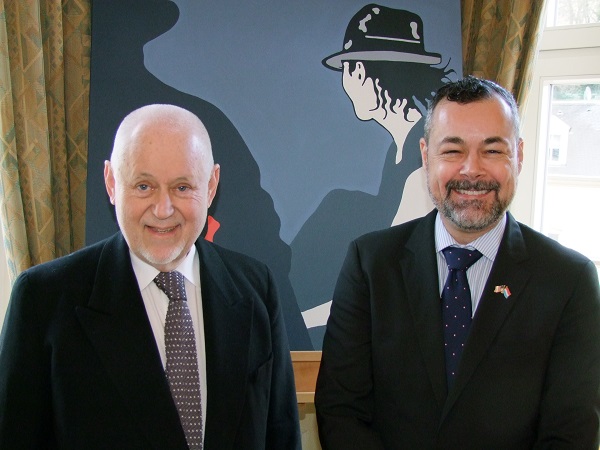 (L-R): Paul Schonenberg, Chairman, AMCHAM; Pepijn M. Helgers, US Embassy;
Credit: Chronicle.lu
(L-R): Paul Schonenberg, Chairman, AMCHAM; Pepijn M. Helgers, US Embassy;
Credit: Chronicle.lu
On Monday 7 February 2022, the American Chamber of Commerce in Luxembourg (AMCHAM) held its first face-to-face ABAL luncheon in almost two years at the Cercel Munster in Luxembourg-Grund.
A total of 21 members and embassy representatives attended the event which was held under CovidCheck 2G+ guidelines and addressed the Ukrainian-Russian issue, with Pepijn "Pep" Helgers, Chief of the Political / Economic section of the United States (US) embassy in Luxembourg, as guest speaker.
Paul Schonenberg, Chairman of AMCHAM, welcomed everyone and expressed how happy he was to see the resumption of face-to-face events, with AMCHAM consciously starting off with small events and leading up to larger events. He encouraged those attending to network. He explained that it is difficult to get a qualitative understanding of what is going on, and the dynamics there, including its impact on business.
Pep Helgers opened his presentation by explaining that the current situation is unprecedented. He explained that the US has responded to Russia's concern and referred to Russia's unprovoked actions towards Ukraine. He added that the US has aligned with its European allies and stated that Russia has reneged on its agreement to leave Moldova, has violated international arms treaties, orchestrating a war in eastern Ukraine and more.
He said that this more than just about Ukraine, that it is more about NATO and about global principles that have guided global business. He argued that Russia believes that these principles are expendable, and has used disinformation which is destabilising. He clarified that Ukraine's defences have been defensive in nature.
He described the current situation as one with global consequences, and said that the US has endeavoured to work with Ukraine about Ukraine. He reported that the US will retaliate should Russia invade Ukraine and/or cut off oil/gas supply pipelines. However, he stated that if Russia decides on diplomacy, the US will meet them for dialogue. He said that previously the US has resolved difficult arms control negotiations.
Following questions from the floor on the question of the issue of the diplomatic standoff, Pep Helgers said that the US will continue its dialogue with Germany to mitigate the cost of sanctions. He said that Luxembourg would also be affected by such sanctions and stressed that there is strong unity among the allies. Regarding the recent announcement that the US is moving B52 bombers to air bases in the UK, he stressed that the US is not using the term "imminent" but is also sending forces to Romania to strengthen its eastern flank to be sure to send a clear message that Article 5 is in effect and the US is prepared to protect its NATO allies. He would not be drawn on specific sanctions but did confirm that they would hurt Russia's economy. Another question described the current situation as a "powder key", to which he explained that all relationships need to be equal, with former Soviet states, e.g. Kazakhstan, being able to invite Russian troops onto its soil, a decision which he stressed must be that country's alone.
On the composition of NATO, he stressed that each of the 30 members has a vote on which new members can join the alliance. He conceded that Russia deems NATO to be an aggressive alliance, instead of a defensive alliance which he claimed it is. On the issue of Ukraine potentially becoming a NATO member, he stated that if Ukraine wants to join NATO, then Russia should not have a veto over that.
Another question, more an observation, referred to the perception of Ukranians, Russians and Europeans about the situation in Ukraine, outside the political dialogue and threat of economic sanctions. He referred to the sense of unity which goes well beyond anything that the US "has even considered". He also conceded that the US is currently looking into imposing sanctions against Russian oligarchs living abroad.
Pepijn M. Helgers joined the US foreign service in October 2009, with his initial assignment on the Georgia desk at Main State, followed by overseas assignments in Sarajevo, Bosnia and Herzegovina, Erbil, Iraq and Prague, Czech Republic. Pepijn returned to Washington to serve on the fast-paced Russia desk, before arriving in Luxembourg seven months ago. He holds a bachelor’s degree from the University of New Mexico, and a master’s degree from Johns Hopkins University School of Advanced International Studies (SAIS).








